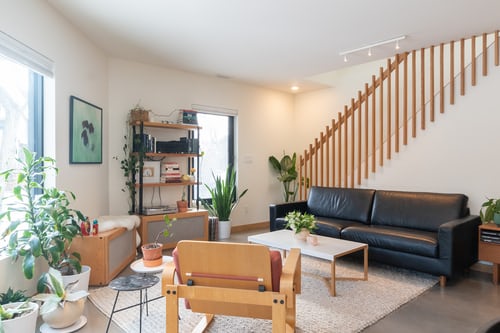By
|
Getting your Trinity Audio player ready...
|
No place can be as comforting as one’s home. Home is where you can rejoice, unwind, and relish. In most cases, many people put their life’s savings to purchase a home. We fail to realize that our homes need protection as much as we – and sometimes, more than that.
How many times have you heard when people bought insurance for a home to find out that it did not save the one item they sought to cover? Insurance for a home is mostly not the first concern on most people’s list, but it acts as a vital backup if things go south.
One of the increasing concerns for homeowners of flats in India is the frequency of natural disasters and unforeseen disasters that brings forth destruction and loss to their property. While we can always wish for the best, we must always be prepared for the unseen. By availing insurance for a home, an individual can avoid a substantial financial setback caused by sudden mishaps to their residential properties , irrespective of the size and type.
Before going for home insurance, it is essential to evaluate the surrounding area where your property is located. It would be best if you grasped how much your house is at risk. If the area where you plan to buy flats is secured and is not prone to many natural calamities, then you could go for a basic plan.
What is insurance for a home?

Home insurance is the type of insurance that protects private homes. Insurance for a home is created to protect a person’s property against any damages to the house or possessions. A home policy is a term contract fixed for a certain period. There are two varieties of home insurance policies: comprehensive policy and basic fire insurance policy, also known as householder’s package policy (HPP). Fire insurance covers your home against fire and other associated perils, including storm, flood, lightning, and riot. Although, some insurers may ask you to pay an extra premium to cover disasters such as landslides and earthquakes. You can insure your house and contents upon terrorism by purchasing an add-on cover.
HPP covers more pieces of stuff. The primary cover bifurcates into two: one covers the building structures against fire and other associated perils, and the second covers the house contents. Tenants can go for just the contents; an HPP also provides optional covers that ensure the home’s contents against damage, electrical breakdown, mechanical, and burglary.
How do you choose the sum insured?
The value of your home has three components: locality, land, and building cost. Insurance will only cover the building cost. In other words, if you have a duplex house in Kolkata priced at 90 lakhs, of which the cost of your building is 35 lakhs, you can ensure your home for a maximum of 35 lakh.
What is the best home insurance plan?
The best home insurance policy offers coverage for circumstances that are out of your control; you should buy insurance for a home that provides you with maximum benefits. Ensure that the best insurance policy offers protection for the components of the house as well.
The best home insurance plan includes the whole house. It would be best if you considered the built-up area and the final cost for construction. This is the reinstatement value. In easy words, you need to make sure that the sum is insured sufficiently to cover the cost of rebuilding the house in case of a sudden and unexpected event.
The best home insurance is the one that matches your lifestyle. The insurance home plan that you buy may not be what your friend or neighbour would find to be best for them. This is because everyone’s choices are different. What you find best may not be best for someone else.
Exclusions in home insurance?
Various aspects won’t be covered in insurance for a home, these includes:
- Loss of cash because of any mishap
- Damage caused by wars
- Damage made to the home or its contents by tear and weak or depreciation
- Damage caused by the invasion
- Damage caused to electronic devices due to excessive use.
Benefits of buying insurance for a home?
Insurance companies provide different plans under house insurance, for example, landlord’s insurance, content insurance, tenant’s insurance and building insurance, etc. Standard insurance for homes covers damages and losses due to theft, allied perils, burglary, and fire accident. Some insurance policies charge additional premium coverage that occurred because of natural disasters such as floods or earthquakes. The main reason for having a house insurance policy is listed below:
- Coverage of temporary living expenses: Suppose your insured house has received some damage, and you cannot live there until you renovate or rebuild it. During the renovation process, if you rent out another flat or apartment to live, till the house you used to live is renovated enough to live there, the insurance company will carry your expenses incurred for paying rent. The upper cap amount is fixed according to the policy wording provided by the insurer.
- Let’s you quickly secure a home loan from banks: Some banks give preference to customers who have a home insured. For particular financiers, home insurance is one of the primary eligibility criteria for getting a home loan. Put your prediction to fair use and be prudent. Ensure your home against all kinds of human-made and natural disasters to assure your family and yourself for a secured future.
- Provides coverage against human-made and natural disasters: An adequate insurance for a home covers your house against the damages and losses that occurred natural disasters, such as storms, typhoons, earthquakes, floods, etc. the policy also covers your house from human-made and anti-social activity, for example, strikes, vandalism, riots, other activities occurred because of the wrong intention, etc. it also allows you to heal from the loss and rebuild your home financially.
- Protection against liabilities: House insurance policies provide liability coverage that covers you against personal injuries, property loss, or damage to guests and other 3rd parties which they might have incurred while residing in the insured house. There could also be damage to third parties for which you or your family legally may be responsible. This coverage is extremely crucial because it provides protection to you and your house from any feasible legal problems.
- Coverage for the damage to your precious assets or personal belongings: Apart from covering the house structure, house insurance companies also offers policies to provide coverage against damage of articles stored inside the insured house. These include expensive, valuable, and essential belongings, including important documents, jewellery, clothing, furniture, and many more.
Is buying a home insurance worth it?
Understanding the basics of the insurance policy is essential. This also includes the insurance value of your property. Every policy you buy provides coverage and has limits. The limits include the maximum amount that the home insurance policy will pay to cover losses incurred. You are to ensure that the policy covers the rebuilding/renovation cost of the home or replacing your belongings if they get destroyed or damaged. And, yes, we suggest that buying a home insurance is essential, however, choose a plan carefully.
FAQ’s
The insured needs to imply the claim to the local office or the company’s call center in such circumstances. The company will send a surveyor, and the claim is settled once the insurable interest is found and the losses assessed. The insured needs to create a KYC document that assists the insurance company in identifying the claimant.
Your car can be covered under a different motor insurance company policy. It will not be part of the householder policy. It is essential to understand that despite the various clauses, in the end, your policy may not cover you for some conditions, but something is better than nothing.
Various aspects won’t be covered in insurance for a home, these includes:
1. Loss of cash because of any mishap
2. Damage caused by wars
3. Damage made to the home or its contents by tear and weak or depreciation
4. Damage caused by the invasion
5. Damage caused to electronic devices due to excessive use.
If you are proposing to sell your house, you should inform your insurance provider about it and terminate your insurance. If you want to, you can keep the cover for the contents of your home; the person buying your home can take a new insurance policy under his name.
Insurance for a home is for everyone who has a home; it doesn’t matter whether it is rented or owned. The common belief with home insurance is that only homeowners should take it. However, in reality, both homeowners and tenants can take an insurance policy. While homeowners insure their house, tenants insure the contents of the home they live in.
Every insurance corporation has its own due date when it comes to insurance claims. Usually, this time ranges between 7-15 days. It is advisable to file a claim as soon as you can. While filing the claim, you need to create an FIR report, police investigation, invoice of owned articles, fire brigade, etc.
Key points you need to know are:
1. Understand the liability cover
2. Know what the noteworthy limits of the home insurance are
3. What features should you look for, and what clauses should you pay attention to
4. How do you make home insurance claims?
Leave a comment







